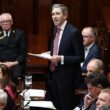It’s now almost three years since European Commission President Barroso announced “a silent revolution in terms of stronger economic governance by small steps”. This has meant using the economic crisis to impose a model of authoritarian neo-liberalism in Europe.
We have seen the transfer of power to unelected and unaccountable bodies like the European Commission and European Central Bank and the writing of Thatcherite economic policies into law.
The latest step is the so-called ‘two pack’ of European regulations. Minister of Finance, Michael Noonan, has posed this as simply a question of changing the time when the Dail discusses the budget – with budgets across the EU having to be agreed now by 15 October. Of course, it is not so innocent!
As well as imposing this “common budgetary timeline”, the two-pack gives significant more power to the European Commission to “request a revised draft budgetary plan”. In other words, it gives them power to demand the rewriting of national budgets if they don’t contain sufficient austerity.
In addition, the Regulations implement a new level of ‘surveillance’ and ‘supervision’. Working people in Ireland having had the experience of the Troika now know exactly what this means – regular visits and diktats which are demanded to be implemented.
They impose ‘Economic Partnership Programmes’ and “enhanced surveillance” – whereby even countries not in receipt of supposed bailouts will be effectively in Troika-like programmes of devastating cuts demanded by the Commmission. This means intense supervision and in reality dictation of economic policies by the European Commission.
This process does not end with the ‘Two Pack’ either – it is simply the latest step. A paper produced by Herman Van Rompuy, President of the European Council on ‘Towards a Genuine Economic and Monetary Union’ spells out a vision for Europe of a section of the political establishments. It says that the “the reforms introduced … are a step in the right direction. But there is a need to go further”.
The “further” that they want is clear. For example, the October 2012 version of this paper calls for “the establishment of a Treasury function with clearly defined fiscal responsibilities.” This is a European Finance Ministry which would write budgets for Europe. That is the medium term goal. It would, however, require Treaty change, necessitating a referendum in Ireland and possibly other countries.
In the shorter term then, what they want to introduce is “arrangements of a contractual nature between Member States and EU institutions.” These will be contracts of austerity containing specific commitments, for example a certain amount of cuts and the privatisation of services. The purpose is yet again to attempt to deny the right of peoples to vote against austerity, as these contracts will bind future governments regardless of their mandate.
The reason for this onslaught against democratic rights is because of fear of mass opposition, protests and strikes that can pressurise and kick-out right wing governments. The way for it to be tackled is with those methods – integrating the fight against these attacks into the Europe-wide struggle against austerity and for a socialist alternative.











